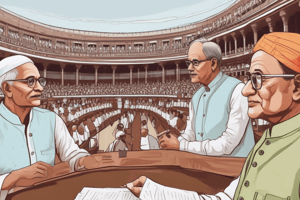Podcast
Questions and Answers
What is required for some Bills to go to the Rajya Sabha?
What is required for some Bills to go to the Rajya Sabha?
- Assent from the President
- Approval from both Lok Sabha and Rajya Sabha
- Approval from Lok Sabha only (correct)
- Approval from Rajya Sabha only
During question hours in Parliament, what do MPs usually ask about?
During question hours in Parliament, what do MPs usually ask about?
- Celebrity gossip
- Sports news
- Their personal lives
- Ongoing issues affecting citizens (correct)
How does Parliament exercise control over the functioning of the Government?
How does Parliament exercise control over the functioning of the Government?
- By ignoring government activities
- By conducting talent shows
- By organizing sports events
- Through Committees, discussions, resolutions, and questions (correct)
What do Standing and Select committees do in Parliament?
What do Standing and Select committees do in Parliament?
What role do Members of Parliament serve as?
What role do Members of Parliament serve as?
Why is understanding the Union Legislature structure important?
Why is understanding the Union Legislature structure important?
Which house of the Indian Union Legislature represents the electorate directly?
Which house of the Indian Union Legislature represents the electorate directly?
What is the term length for members of the Rajya Sabha?
What is the term length for members of the Rajya Sabha?
Which house plays a crucial role in revising Bills passed by the Lok Sabha?
Which house plays a crucial role in revising Bills passed by the Lok Sabha?
In what way are members of the Lok Sabha elected?
In what way are members of the Lok Sabha elected?
Who holds a mostly ceremonial role in the Parliament of India?
Who holds a mostly ceremonial role in the Parliament of India?
Which house of the Indian Union Legislature has equal representation as per population?
Which house of the Indian Union Legislature has equal representation as per population?
Flashcards are hidden until you start studying
Study Notes
Union Legislature in India: A Comprehensive Overview
The Indian union legislature is a vital institution responsible for passing laws, debating public policies, scrutinizing executive actions, and representing the people's interests. This system consists of two houses—the Rajya Sabha and the Lok Sabha—with distinct features, roles, and functions within the federal structure of our nation.
Parliament of India
The Parliament of India is the supreme lawmaking body, comprising the President, who holds a mostly ceremonial role, and the two Houses: Rajya Sabha and Lok Sabha. It has a dual responsibility to ensure that both national integrity and state autonomy are maintained.
Rajya Sabha
Rajya Sabha, meaning Council of States, is the upper house consisting of elected representatives with a six-year term; one third retiring every two years through indirect elections by State/UT Legislative Assemblies. While it does not have equal representation as per population like its lower counterpart, Rajya Sabha plays a crucial role in revising Bills passed by the Lok Sabha.
Lok Sabha
Lok Sabha, meaning House of People, represents the electorate directly. With members serving five-year terms unless dissolved earlier, it follows a 'first past the post' method of election based on single-member constituencies throughout India.
Functions and Powers of the Union Legislature
Lawmaking
Under normal circumstances, bills must pass through both houses before they can become acts. However, some Bills can only go to the Rajya Sabha if approved previously by the Lok Sabha, while others need the approval of either house but later assent from the President. The Constitution also allows for special procedures involving financial matters and constitutional amendments.
Debates and Question Time
Both Houses conduct regular question hours where MPs ask questions related to their specific portfolios and ongoing issues affecting citizens. Additionally, discussions on important policy decisions, budgetary allocation, and other pressing concerns take place during sittings, providing avenues for MPs to voice their opinions and seek information from government officials.
Scrutiny and Oversight
Parliament exercises control over the functioning of various arms of the Government through Committees, discussions, resolutions, and questions. For instance, Standing and Select committees examine specific areas of governance and assess the performance of ministries.
Representatives of the Citizens
Members of Parliament serve as advocates of the peoples' interest when deliberating upon laws and policies. They raise public grievances and work towards improving living conditions and accessibility of basic amenities.
In conclusion, understanding the Union Legislature structure and its working principles provides valuable insights into effective democratic governance and how rules are shaped in today's socioeconomic milieu.
Studying That Suits You
Use AI to generate personalized quizzes and flashcards to suit your learning preferences.




